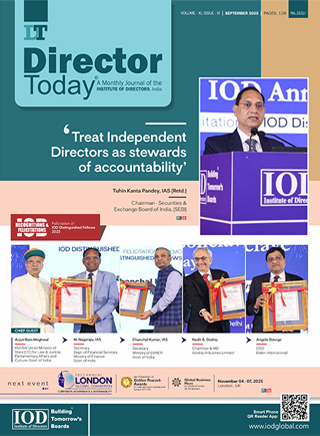Corporate Governance in Uganda

Governance Reboot: Uganda's Corporate Evolution in a VUCA World
Insights from the Institute of Corporate Governance of Uganda (ICGU)
Uganda uses a hybrid of international or regional standards and codes to assess the levels of observance of corporate governance.
Simply defined, “Corporate Governance is about the systems and processes by which an organization is directed and controlled”. The term corporate governance is relatively new among the Ugandan society but what it seeks to describe has been in existence for as long as there have been organizations. The corporate governance framework for Uganda was founded on the British legal structure from which the relevant corporate laws and regulations were adopted by the colonial and post independence governments of Uganda. Hence, it is right to say that Uganda's corporate governance practice and outlook are influenced by the “Anglo- Saxon Corporate Governance System”.
At the turn of the 21st Century, the Government of Uganda decided to liberalize the economy through a Restructuring and Privatization policy guided by the International Monetary Fund (IMF)/ World Bank Structural Adjustments Programmes. There arose the need to train Ugandans to be ready to serve on the Boards of parastatals that were being privatized and other new ones anticipated to emerge with inflows of Foreign Direct Investments. Hence, ICGU was established in 1998 out of a series of high-level meetings, with the mission “to promote excellence in Corporate Governance principles and practice in Uganda and the Great Lakes region”. These meetings were the Edinburgh Commonwealth Heads of Government Meeting (CHOGM) held in October 1997, the Commonwealth Technical Policy Conference held in London in April 1998 and the June 1998 regional Workshop on Corporate Governance held in Kampala with delegates from the private and public sectors of Uganda, Kenya, Tanzania and Rwanda. These three meetings discussed corporate governance culminating in a resolution that Uganda (and the other East African Countries) should establish national institutes that would promote good corporate governance, both at national and regional levels within the framework of the East African Cooperation. A Task Force of ten (10) eminent Ugandans was put in place to set up the Institute between June 1998 and December 2000 when the first Council was elected and ICGU was birthed.
The term corporate governance is relatively new among the Ugandan society but what it seeks to describe has been in existence for as long as there have been organisations.
Today, ICGU is the leading institution in Uganda propagating and promoting international corporate governance principles and deepening its best practices in Uganda. Other Government institutions handling similar tasks are the Inspectorate of Government (Ombudsman), Office of the Auditor General, and Parliamentary Accountability Committees. There are also Professional bodies campaigning for good corporate governance in the country and they include, the Institute of Chartered Public Accountants of Uganda (ICPAU), Uganda Law Society (ULS), Uganda Institution of Professional Engineers (UIPE), among others. Some sector regulators have also joined in the efforts to push for entities to embrace good corporate governance in the public, private and non-state sectors by making sector-specific guidelines.
Uganda uses a hybrid of international/regional standards and codes to assess the levels of observance of corporate governance, namely: the UK Corporate Governance Code, OECD Principles of Corporate Governance, the King IV Report of South Africa, and the African Peer Review Mechanism Guidelines. Meanwhile, the local guidelines include: the Institute of Corporate Governance of Uganda (ICGU) Manual, 2008, Schedule F of the Companies Act, 2012, The Uganda Security Exchange Guidelines.
The Capital Markets Authority Corporate Governance Guidelines: The Consolidated Corporate Guidelines for Regulated Financial Institutions and the Uganda Insurance Regulations.
The country is developing a National (Corporate Governance) Code for Uganda under the leadership of ICGU that is intended to cover the interests of various stakeholders in the economy depending on their level of appreciation of the concepts of corporate governance. These levels are: Listed Companies, Private Unlisted Companies, State Owned Enterprises, SMEs, NGOs, and Family-run entities.
There is a dire need to intensify the awareness creation and enforcement of corporate governance codes and regulations in Uganda because of the recent experiences of business collapses with negative repercussions to economic stability and growth of the economy. Notably, the collapse of several commercial banks (namely, Teefe Bank, Greenland Bank, International Credit Bank and Cooperative Bank) in the 1990's was not only a watershed moment in the financial institutions sector but also the entire corporate governance industry in Uganda. Crane Bank also closed shop in 2016 and in this year (2024) alone, two more Financial Institutions have been closed by the regulator, the Bank of Uganda. These are the EFC Bank and the Mercantile Credit Bank, all citing poor corporate governance as the major reason for their closure.
Other companies that have also closed down due to poor corporate governance include Sembule Steel Mills, Uchumi Supermarket, Tuskies Supermarket, Shoprite Supermarket, and Game Stores. Moreover, several corporate scandals are reported in the media on a daily basis indicating poor corporate governance practices, especially relating to incompatible behaviour and poor working relationships between the Board and top management teams. Some of the recent cases include Uganda National Bureau of Standards, Uganda Electricity Transmission Company Limited, and the Uganda Investment Authority.
Like elsewhere in the world, the emerging trends in Boardrooms in Uganda are about Environmental, Social, and Governance; Diversity, Equity and Inclusiveness; and Stakeholders' Activism, especially amongst the millennials and Gen Z's, who, by leveraging the power of the internet and social media, have access to unlimited information on what goes on in the boardrooms, coupled with advancements in cyber communications and Artificial Intelligence (AI).
Another real issue in the boardroom now relates to fighting rampant corruption in organizations which are arising from poor business ethical practices.
The ICGU, with its partners, have to step up the gear to enhance continuous Director Development Programs to give NEDs sufficient clout to wither the storms in the boardroom and cope with, and maneuver the atmosphere to ensure their institutions remain resilient and create sustainable impacts in this VUCA world.
Author
Mr. Dison B. Okumu
Chief Executive Officer - Institute of Corporate Governance of Uganda (ICGU)
Owned by: Institute of Directors, India
Disclaimer: The opinions expressed in the articles/ stories are the personal opinions of the author. IOD/ Editor is not responsible for the accuracy, completeness, suitability, or validity of any information in those articles. The information, facts or opinions expressed in the articles/ speeches do not reflect the views of IOD/ Editor and IOD/ Editor does not assume any responsibility or liability for the same.

 Quick Links
Quick Links
 Connect us
Connect us




 Back to Home
Back to Home































